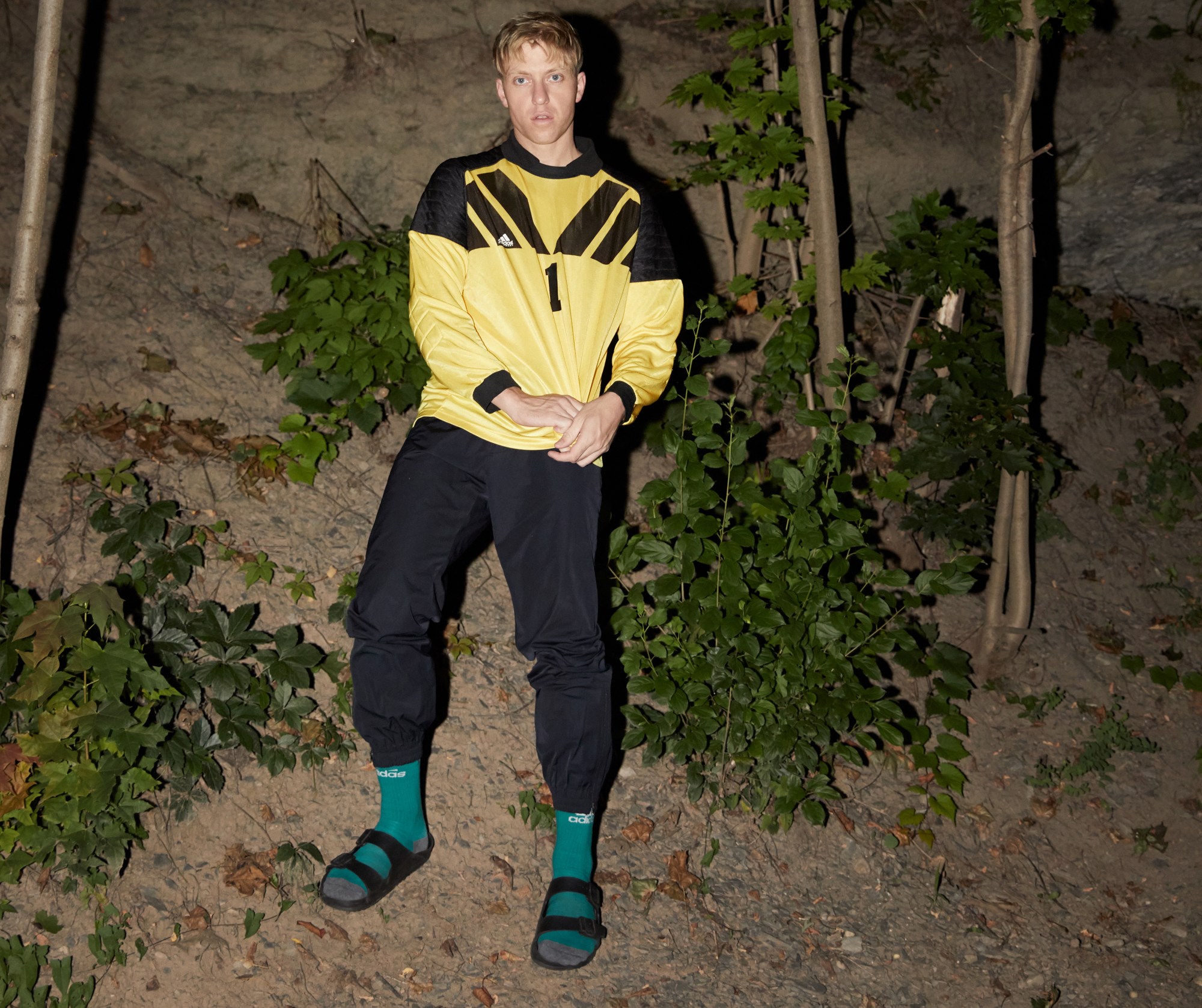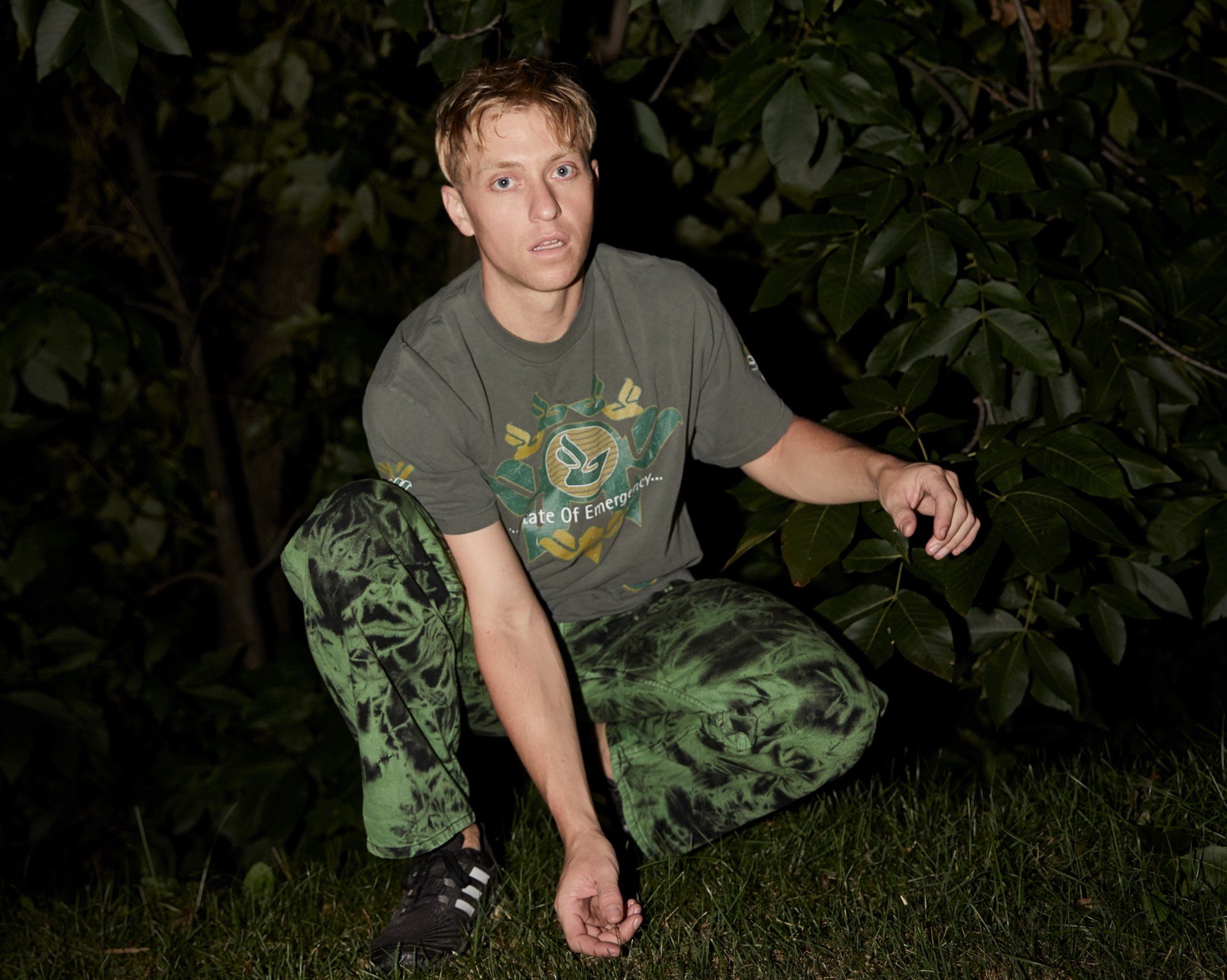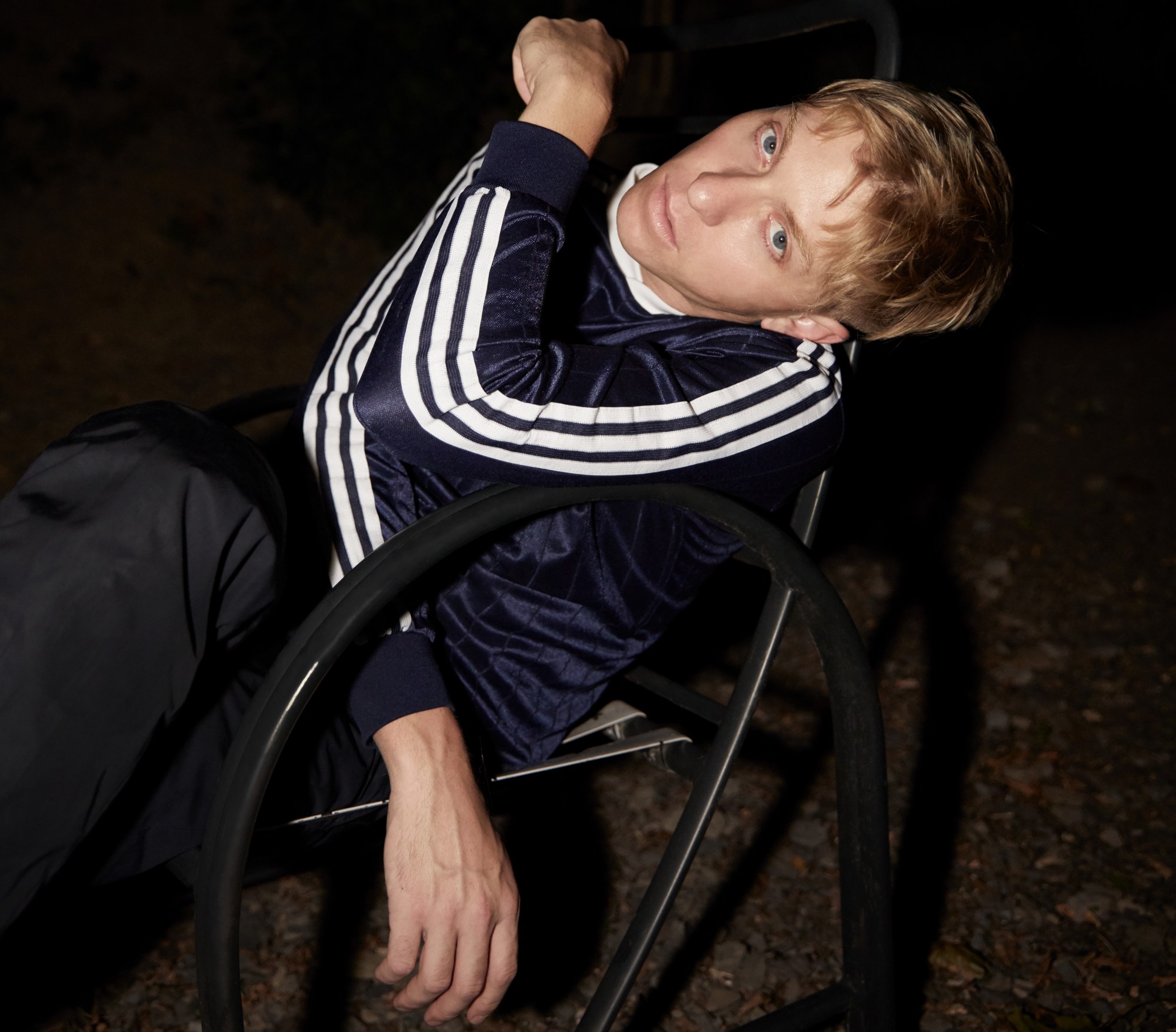Jonny Pierce first discovered The Smiths at the age of fifteen in his childhood bedroom in upstate New York. Growing up in a “very anti-Gay household” with two Pentecostal pastors as parents, he spent a lot of time hiding out, lonely, and insecure. “I was feeling like such a sinner because I was gay and attracted to men. Then I stumbled upon The Smiths and suddenly felt like there’s one other person on this planet that feels the way I do. You know?” Pierce says. “And I want to provide that. I want to be willing to say things that maybe aren’t so fun to say.” Pierce admits he often still feels like this teenage version of himself, but on Brutalism, the fifth album by The Drums, he confronts the demons of his past in hopes that listeners will know they’re not alone.
Brutalism is an album composed of warm, sunny pop songs, but peeling back the individual layers reveals something much more raw and vulnerable. It’s about feeling like an outsider, coming to terms with depression, and crazy intense love. And the record’s come together all around the world. “This album’s been in rural country. Upstate New York. It’s been in New York City, LA, and Brussels,” Pierce says, over the phone and over the honking of cabs. This street noise is unavoidable in New York — the place where The Drums grew up, over the course of a 10-year musical career, and became the cult indie band that it is today. i-D caught up with Pierce to hear all about his first release since 2017’s Abysmal Thoughts and his second as a solo artist.
Are you back in New York for good or just visiting?
Technically, I’m living in Los Angeles, but New York is my home. I lived here for 15 years. It’s taught me everything I know! I feel more calm in New York and more frantic in L.A. It’s the wide open spaces. It’s what I ran away from — a small town in suburbia. I moved to the big city and I fell in love with it, so going anywhere, including Los Angeles, feels like a suburb. That’s when my panic sets in. I’m not so good with the stillness. Since I started The Drums, I really had been on the go whether it’s touring or working on another record.
My first few weeks [in LA] were kind of depressing. I cried a lot. Things started rising to the surface that I didn’t want to deal with and some were issues that I’ve been pushing down my whole life. But you start confronting these things and realizing that they’re not all that scary and you get to a better place. Writing Brutalism was sort of the beginning of that. It’s an album where I was really focusing inward rather than looking out. I really wanted to start asking myself some questions: who am I and how do I learn to love who I am? How do I become more secure with who I am? But I don’t think it’s a record full of answers.

Do you have a sense of why now? Why this album?
I’m in my thirties now and I think it really just came down to being sick and tired of not beating it. If you want something to change, you can’t keep approaching it in the same way. Before this album, I really had a tendency to romanticize pain and hardship and I would write about it in that way. I love that and I think that’s beautiful, but it’s not good long-term. I’m not just writing songs or writing poems about being depressed. I was actually depressed. It really felt like the only option if I wanted to keep growing, even though it was really difficult. I started doubling down on therapy. I started taking my health seriously.
Did you find that it was therapeutic to be making music in this way?
Yeah. Most of the music that I had released previously was written, produced, and recorded by me. I started that way because I didn’t have other options. I didn’t have money. I was tinkering away and suddenly I had an EP, then an album, and things took off. It felt natural. But I think I was afraid to disrupt the fragile balance of the sound of The Drums. I was worried that by changing up my recording process or handing someone else the reins it could derail something that was moving along just fine.
I’m all about growing and changing. Making this music is a big part of my life. And I want my art to reflect that, so [on this album] I opened myself up. I brought in a guitar player, a drummer, a mixing engineer, and a sound engineer. I had a producer come in. And we just came up with something that I think is really special and I don’t think it’s an album that would have existed otherwise. I was able to decide what’s truly important to me and focus on that. And of course for me, it’s the messaging and the lyrics. It just gave me so much more space and time to sit there with my thoughts.
At the same time, some of these songs are the poppiest you’ve ever made. Was this intentional or did this just come out of the process?
This evolution in the sound is sort of like going back to my first love. When I was growing up, I was really drawn to pop music and fascinated by it as a teenager. I had a synthesizer that my father gave me when I was thirteen and I started making pop songs. The first EP and album are kind of poppy. They didn’t have the pop production and they were more – for lack of a better term – indie sounding. Then as the albums went on things got a little bit more fragile sounding and maybe a bit more subtle. For this album, I just wanted to be more clear, more honest, and more direct. My lyrics certainly are this way. I wanted people to see a clear distinction. But for me, this is pop that is meaningful. You have these songs that sound really sure of themselves musically, but when you pull back the layers and listen to the lyrics there’s all sorts of insecurity and sadness.
It’s returning to that pop sensibility, but with a lot of lyrical vulnerability that maybe you didn’t feel comfortable with until a couple records in.
Yeah, the whole thing does kind of feel like a redo. This album is like my first album in so many ways. It’s where I’ve wanted to go for a long time, but it hasn’t really worked out until now. I feel really lucky to be in a band that’s survived this long and that’s still doing something that people care about. Even more importantly, to still be inspired. I think the key is remaining curious, open, and to hold on to who you are as well.

You mentioned that “Body Chemistry” and “Loner” feel like the cornerstones of the album. What do you mean by that?
I think if I had to sum up how I’ve felt my entire life and sum up the message of The Drums in a song or two, I’d choose those songs. The idea of feeling like an outsider is what everything spawns from. It’s what my heartbreak comes from. Sometimes my happiness comes from that idea too. It dictates so much in my life, this feeling of not belonging, of having to forge a new path and get extra creative about really everything in my life. I learned that when I was a little kid, coming out to my parents, both of them being born again pastors of a church and not understanding me. Making me feel like I didn’t belong. That’s always stayed with me. Those two songs really speak of that. There’s been this feeling of this invisible wall between me and everyone else. Even when I’m on tour playing in front of thousands of people, it’s really hard for me to feel like I belong. It’s good to talk about it. It’s a universal thing that a lot of people deal with and that they don’t feel safe enough to express or even admit to themselves, but they know deep down that something’s off and they feel a bit detached. I just felt like by writing about it, it’s a way to help people feel like they’re not alone, you know? Because I put out a song like “Body Chemistry” and I get a thousand DM’s from kids all over the world saying, ‘Oh my God, I feel the exact same way.’ It just helps.
Early on, you were afraid to come out to fans and be vulnerable. Do you find that that fear ever comes back?
I feel like I’ve really tapped into one of my own personal truths by saying how I feel and that makes me feel more connected to people. But that doesn’t mean that it gets any easier. It’s one thing to express yourself and it’s another thing to take action and figure it out. I’m trying to do both right now. In one sense, I feel like I’m that 15-year-old boy living in upstate New York, who’s really scared and I’ll always carry a part of that with me. It’s just become part of my DNA now.
The album takes its name from the song “Brutalism.” What’s this song about?
Well, when I was making the album I was touring a little bit and I ended up falling in love with someone that I met in Belgium. And I’m someone who loves really hard. I’m an intense person. I just thought I wanted to be with this guy, so I completely uprooted my life in America and moved into an apartment in Belgium like a crazy person. We had all these problems way too quickly and I found myself really unhappy. We couldn’t leave each others side, but he was treating me pretty poorly and demanding so much of me. I couldn’t imagine not being with him. I was just so deeply in love that it was brutal. And my whole life, I’ve been really into Brutalist architecture. It’s heavy, it’s hard, and it’s impractical. It’s bleak. And it’s all the words that I’ve used to describe this relationship. In Brussels, specifically, there’s Brutalist architecture everywhere you turn. You’re surrounded by it. The whole thing was calling to me.
I moved over there with the idea that I’d write this entire album in Belgium, but then I was so exhausted emotionally that I didn’t have time to write anything more than one song. It’s called “I Wanna Go Back” and it talks about just desperately wishing to hit the rewind button to a love so pure and simple. But it wasn’t possible and the time had passed. It’s a swan song, of wishful thinking. I’m still that crazy kid that’s moving to Belgium for a boy. It’s a part of being open! Being curious about life. I think I’d always take the risk than not and miss out on something wonderful. Who knows? I don’t know. You grow up and you realize, ‘I’m just a kid in a bigger, older body.’
